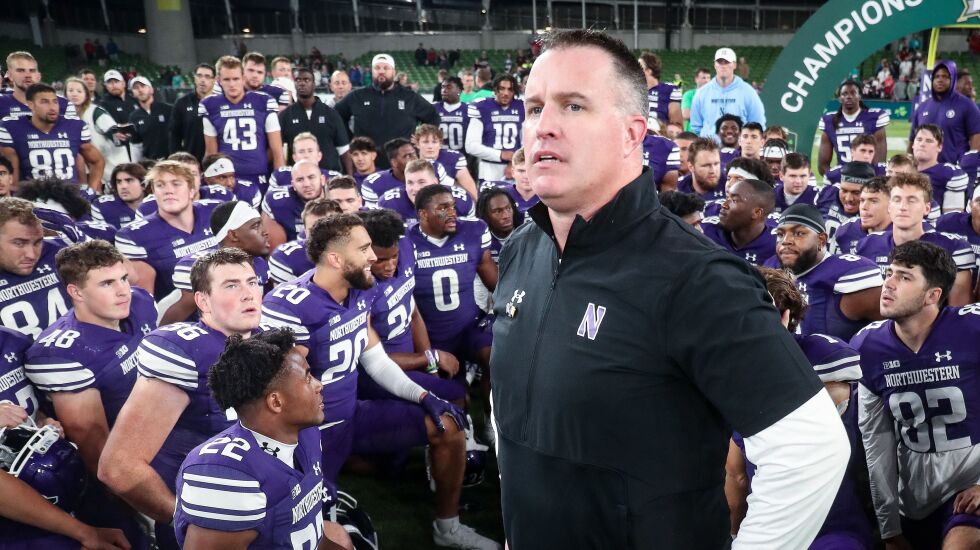
It’s the thing that coaches say when they want to make a show of taking responsibility for something unpleasant involving their teams, whether it’s a loss on the football field or a player’s misconduct on the street: It starts with me.
Northwestern should have used that as a guide when punishing Pat Fitzgerald for a hazing scandal that occurred on his watch as head football coach. Instead, the school suspended him for two weeks in July, which is like suspending a bear during hibernation. That slap on the wrist Friday led to waves of criticism crashing upon Northwestern. A day later, drenched university president Michael Schill announced that he would reconsider Fitzgerald’s discipline.
To sum up, a football coach allegedly didn’t know that some of his players were dry-humping teammates, usually freshmen, as sadistic punishment for practice or game mistakes, and a school had to scramble to think about a harsher penalty for a coach apparently unaware something so ugly was going on in his program.
Pathetic, all the way around.
If everything indeed starts with the coach, then NU needs to fire Fitzgerald. If the school really does put the well-being of its students first, then it needs to find someone else to run the football program. And if the university’s trustees are paying attention to this very public mess, they might want to take a hard look at the man handing out two-week vacations that are masquerading as suspensions.
It took the university’s student newspaper, The Daily Northwestern, to bring to light what the school chose not to after a six-month investigation that it had authorized. According to an anonymous former NU player, the football team engaged in a practice called “running.” Eight to 10 teammates would dry-hump a restrained player in a dark locker room as punishment for a mistake made during a game or practice.
“It’s a shocking experience as a freshman to see your fellow freshmen teammates get ran, but then you see everybody bystanding in the locker room,” the former player told the newspaper. “It’s just a really abrasive and barbaric culture that has permeated throughout that program for years on end now.”
These days, the message is simple for a coach and a university: Protect your athletes. Protect college kids from themselves. Don’t allow anything that will bring embarrassment upon the school. In terms of responsibility, that message is paramount.
The question, as Schill pointed out in a letter to the NU community Saturday, isn’t whether Fitzgerald knew about the hazing. It’s whether he should have known. And if we go by what he and his fellow coaches always say — It starts with me — then the answer is obvious. He should have.
That said, it’s very hard to believe that a coach as celebrated for his connection with his athletes as Fitzgerald is didn’t have a whiff of any of this. Especially someone who was a two-time national defensive player of the year at Northwestern and someone who has been with the school as an assistant or head coach since 2001. He has never given the impression that he’s holed up in his office watching film. In fact, the school has gone to great lengths to promote an image of a coach who’s engaged with his players. A coach who makes football joyful.
Northwestern loves Fitzgerald and, for the longest time, he could do no wrong. He was young, fun and animated. He built on the success of his predecessors, Gary Barnett and Randy Walker. He was lauded for his winning ways, for his enthusiasm and for his apparent wholesomeness. Northwestern hasn’t been winning much of late, and now this. It’s fair to say that St. Fitz’s halo has been bent.
But the school looks even worse than he does, and that’s saying something. A soft suspension looks terrible in light of the university’s controversial push to rebuild Ryan Field at a cost of $800 million. It has the feel of a carpet being lifted and some uncomfortable dirt being relocated.
This isn’t Joe Paterno, Jerry Sandusky and Penn State. That involved a pedophile coach, Sandusky, abusing children and the school covering it up. But you’d think Northwestern and Fitzgerald would have learned from that awful chapter in college football history. When an adult coaches young men, he’s responsible for everything that goes on in his program. Part of that responsibility involves knowing as much as possible about what happens in the locker room.
It’s not 1995 anymore, and this isn’t boys being boys. This is players humiliating younger teammates in an era when everyone is supposed to know better. A letter written by NU “team leaders’’ sent to media outlets called the former player’s accusations “fabrications.’’ College football players standing up for their head coach is predictable, though not necessarily convincing.
It starts with Fitz, and he and the school have been found wanting.







